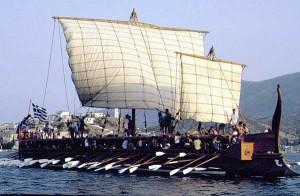Salamis Sea Battle
This is a short narration of one of the most important battles in European History; it took place on the 29th of September of 480 B.C.
 The Persians had defeated Leonidas and his 300 Spartan soldiers in the Battle of Thermopylae; they had plundered and looted the Sanctuary at Sounion and defenseless Athens, as the vast majority of its people had thought that defending their city was hopeless; and they were well on their way to conquering all of Europe, but first they had to defeat the Athenian Army and Fleet. King Xerxes, leader of the Persians, sailed with his fleet to the Saronic Gulf. Confident of his victory, he installed himself at the top of Mt. Egaleo on the mainland, from where he could oversee the battle and ultimately rejoice in his victory. He sent half his fleet to Corinth to block the Athenians route from the Peloponnese, and the other half was dispatched to Elefsina. Aware of this, the heavily outnumbered Greek fleet, led by Themistocles and Evriviades, sailed into the narrow straits of Salamis, where they prepared to make their stand against the Persian Fleet.
It should be noted that Themistocles considered that whatever the cost of the war in terms of losses, it would be better to die a free citizen than to be conquered by the barbarians. In fact, so devoted to his patriotism, Themistocles once had Persian representatives executed because they had the audacity to use the Greek language, a tool of expression to serve free people, to carry out barbarian orders!
And so, outnumbered by more than 3 to 1, both in ships and in manpower, but being free citizens in a democratic society and determined to remain so, the Athenians faced the Persians and fought from dawn until twilight. The Persian ships, being bigger and faster than the Athenian fleet, were unable to utilize their superiority in the narrow and shallow strait! By nightfall, the Persian fleet had been decimated; the beaches were littered with corpses and the sea filled shore to shore with the wreckage of some two hundred Persian ships. What remained of the once mighty fleet returned home, never again to threaten Europe.
Should you wish to find out more about The Battle of Salamis, to understand how it acquired such mythic status for the Greeks, we suggest you read Herodotus, storyteller and mythmaker par excellence. Book VIII deals with The Second Persian War, and chapters 83-96 deal specifically with Salamis. There are many editions, but the obvious one to go for is in the Oxford Classical Texts series. |
|



